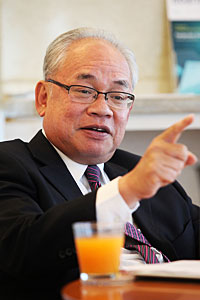It takes two to tango, and the same goes for corruption. Since bribery involves those who pay and those who get paid, this puts a spotlight on the private sector — seen as the supply side of corruption — and specifically on its role in combatting graft.
The new administration has expressed its intention to seriously uproot corruption, so the private sector must play its part. There are simple steps the private sector can take to help fight this crucial battle.
First and foremost, companies must adopt good corporate governance to enhance the integrity and profile of their businesses. Good governance promotes creation of value and is incompatible with corruption, which is value-destroying, both at the macroeconomic level and at the company level.
Second, companies can join forces and commit collectively to fight corruption through ethical business practices. Business associations can help with this by facilitating and coordinating a Collective Action Against Corruption (CAC) policy. It can adopt a zero-tolerance stance against corruption and put in place and enforce high compliance standards.
Third, companies, through business associations, can advocate reforms of government processes and administration that are prone to corruption. They can collaborate with the government by providing first-hand information on the risk of corruption in different areas of business activities, as well as providing resources to help implement the reform.
Such collaboration is a win-win and easier to achieve if the advocacy is done collectively.
Therefore, to effectively tackle corruption, companies must commit themselves to these efforts, or graft will continue to thrive. The good news for Thailand is that the private sector is making headway in taking all the three steps.
Indeed, the corporate governance (CG) practices of Thai listed companies have been improving steadily, to the extent they now arguably lead regional peers.
This is evidenced by the CG ratings conducted by the Thai Institute of Directors and the Asean CG scorecard.
However, more needs to be done to further improve the rating scores and, more importantly, to extend good practices beyond the listed companies to cover a wider segment of the private sector.
To date, 346 companies, including 170 listed firms, have joined the private-sector CAC, set up in 2010. Signatories to the CAC voluntarily commit themselves to clean business practices and high compliance standards.
The commitments are subject to external verification before they are certified by an independent CAC committee. So far, 54 companies have been certified.
Next, the private sector is collaborating with government agencies to advocate reform of government processes for greater efficiency and to reduce corruption risk.
This has included improvements of government procedures in 43 front-line services through new Service Level Agreements between the Office of the Public Sector Development Commission (OPDC) and 40 government departments (along with input and coordination from the private sector).
Lately, there has been a growing movement in favour of greater transparency and accountability in the government's procurement processes.
All these are works in progress, but they nevertheless demonstrate how the private sector is seriously engaging in the fight against corruption.
But to make a real dent in corruption, the current effort is not adequate and a lot more is required from the private sector. To this end, it is important that business and industry associations are more active in leading the efforts.
Business and industry associations — both Thai and foreign — must therefore push for an industry-wide adoption of business integrity and anti-corruption policies and practices, by all their members.
In this, the roles of business associations and chambers of commerce are crucial because companies are more likely to say no to corruption if their competitors and peers are doing the same (for example, if they are reasonably sure that they face a level playing field).
By agreeing to collectively adopt the CAC principle, industry clusters and associations will be better able to persuade their members to join the scheme.
A good case in point is finance. Driven by their respective associations, most companies in the financial sector, including all Thai commercial banks, securities companies, asset management companies, as well as insurers, have signed up with the CAC.
It is time that other business and industry associations do the same. This will add momentum to the nationwide clean business movement.
Yet solely engaging the private sector to fight corruption will not work. It has to be matched by a corresponding effort by the public sector.
Without improvement in the public sector's governance and without determined head-on tackling of the malpractices in ways the government does its business, fighting corruption by the private sector will be a lost cause.
This is why the current administration must stay true to its pledge to uproot corruption by strengthening the rule of law and reforming governance of the public sector.
Weakness in these two areas has contributed to Thailand's endemic corruption problem and has held back economic progress and the country's international competitiveness for far too long.
Thailand can no longer afford to stay nonchalant. The public and the private sector must join hands and seriously do their parts to fight corruption. Only if and when this happens can the battle against corruption be effectively fought and won. It's now or never.
Bandid Nijathaworn is president & CEO of the Thai Institute of Directors Association and secretary-general of the Collective Action Coalition against Corruption.
